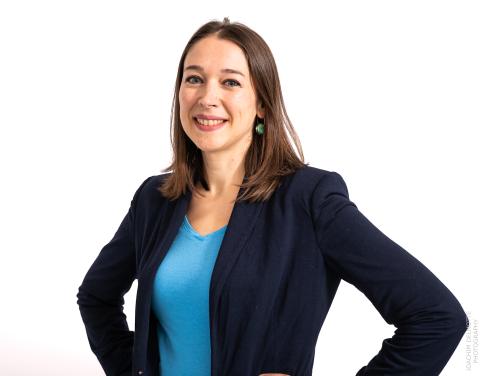
Marina Kvaskoff: research in the service of women's health
Marina Kvaskoff is a member of the Exposome and Heredity team at the Centre for Research in Epidemiology and Population Health (CESP - Univ. Paris-Saclay / French National Institute of Health and Medical Research, Inserm / Université Versailles-St-Quentin, UVSQ). For almost twenty years, this epidemiologist has focused her research on endometriosis, fighting relentlessly to fund and raise awareness of it, thus helping to make this disease central to public health priorities in France.
Endometriosis is a disease that mainly affects women, characterised by the presence of endometrial-like tissue outside the uterine cavity. This causes inflammatory reactions and the formation of lesions that can sometimes lead to disabling pain. It affects 200 million women of childbearing age worldwide - or one in ten - including two million in France. Although its symptoms have been known since ancient times, this chronic gynecological disease, responsible for debilitating effects and a major cause of female infertility, has long been overlooked by the medical and research worlds, by society and by women themselves...
"The stories of women with endometriosis suggest that they have suffered from a significant lack of attention to their complaints and diagnostic wandering. This has left them helpless in the face of their pathology, the symptoms of which have often been associated with mental illnesses throughout history," explains Marina Kvaskoff, who became aware of the extent of the phenomenon when she met the Endomind patient association in 2016. "That was a decisive moment for me. When these patients learned that I was conducting research on endometriosis, they contacted me in search of data and knowledge. I felt the need to put my freedom as a researcher at the service of this societal issue," says Marina Kvaskoff, who admits to dedicating "considerable energy" to the project.
From melanoma to endometriosis
Marina Kvaskoff stumbled upon endometriosis somewhat by chance during her thesis work, which she was carrying out under joint supervision between the University of Queensland in Australia and Université Paris-Saclay, after completing her 2nd year Master’s degree in public health. She discovered data on this non-malignant hormone-dependent gynecological disease while studying the links between hormonal exposure and the risk of cutaneous melanoma. "I was astonished to find that we had so little epidemiological knowledge, despite the significant impacts on women's lives," she recalls.
After several periods spent between the two countries, she defended her thesis in 2009 and then joined Harvard University in Boston. While in Boston, she worked alongside Stacey Missmer for a few years, a pioneer in the epidemiology of endometriosis who became her mentor and is now President of the World Endometriosis Society. To set up her research project, Marina Kvaskoff received initial funding from the Bettencourt Schueller Foundation (Young Researcher Prize), then a grant from the ARC Foundation, quickly followed by a Marie Curie Fellowship. Returning to France in 2014, she worked as a contract researcher in the Exposome and Heredity team at CESP, before passing the competitive examination for the French National Institute of Health and Medical Research (Inserm) two years later, followed by her Accreditation to Supervise Research (HDR) in 2017.
Because they don't kill
Today, Marina Kvaskoff is more broadly interested in gynecological health. She is in the process of setting up a project to create her own research team at CESP. "In addition to endometriosis, we want to study uterine fibroids and polycystic ovary syndrome (PCOS), diseases that are also under studied. Because they affect menstruation (and don't kill), these taboo conditions attract little funding. Yet, fibroids affect one in four women!" argues the epidemiologist. Her group, currently consisting of twelve people, will soon expand. "We need researchers from a wide range of epidemiological specialities, including the humanities and social sciences."
The availability of different cohorts is an invaluable tool for epidemiologists. "We mainly work on population-based cohorts, such as the E3N-Generations cohort, and on ComPaRe-Endometriosis, a patient cohort I set up in 2018. The aim is to identify risk factors for this disease, its heterogeneity, its progression and its long-term impacts on women's health, based on data collected from them." A major focus of the group is to document the factors involved in the progression of endometriosis with regard to the patients' environment: treatments, potential exposure to chemical pollutants such as dioxins, polychlorinated biphenyls (PCBs), organochlorine pesticides or perfluorinated compounds. "The impact of air pollution, domestic exposures, not to mention genetic factors, is also unknown," adds Marina Kvaskoff. "Exposures occurring in the pre-pubertal period potentially play an important role."
Very recent visibility
Of course, this research is helping to put the spotlight on women's health, which has very recently become a societal and even political issue. "By finally stepping out of the shadows, endometriosis brings with it all the other female pathologies yet to be studied." The researcher highlights a key moment in 2014 in the United States, during the first Endomarch organised to mark World Endometriosis Day, which has since been held every March. At that time, several celebrities affected by the disease also made their condition public, which was later relayed in France and Europe through social media and patient associations. "These associations have really done a tremendous job of raising awareness and initiating dialogue with politicians."
The result: European countries soon followed Australia, the first nation to adopt a national endometriosis strategy plan. France, the second country to implement such a strategy, saw the government initiate the recent launch of the Priority Research Programme and Equipment (PEPR) on Women's Health, Couples' Health, led by Inserm. "I'm co-coordinating the endometriosis axis of this PEPR and a research programme focused on the epidemiology of the disease," says the researcher. "This programme is spread over five years. The aim is to characterise endometriosis in greater detail (prevalence, incidence, environmental and genetic risk factors) at different stages in the lives of French women. Since 2021, a foundation dedicated to endometriosis research has been distributing funds to study the disease."
A multi-award-winning investment
Among the many distinctions Marina Kvaskoff has received in her career, the Inserm-OPECST Science & Society Prize received in 2023 holds a special place. This prize honours a researcher and their team for their ability to engage in dialogue with societal expectations. "I received it as encouragement to continue developing research into these pathologies," shares the researcher, who now dreams of "developing epidemiological research into gynecological health. All in the service of women in France and around the world."

